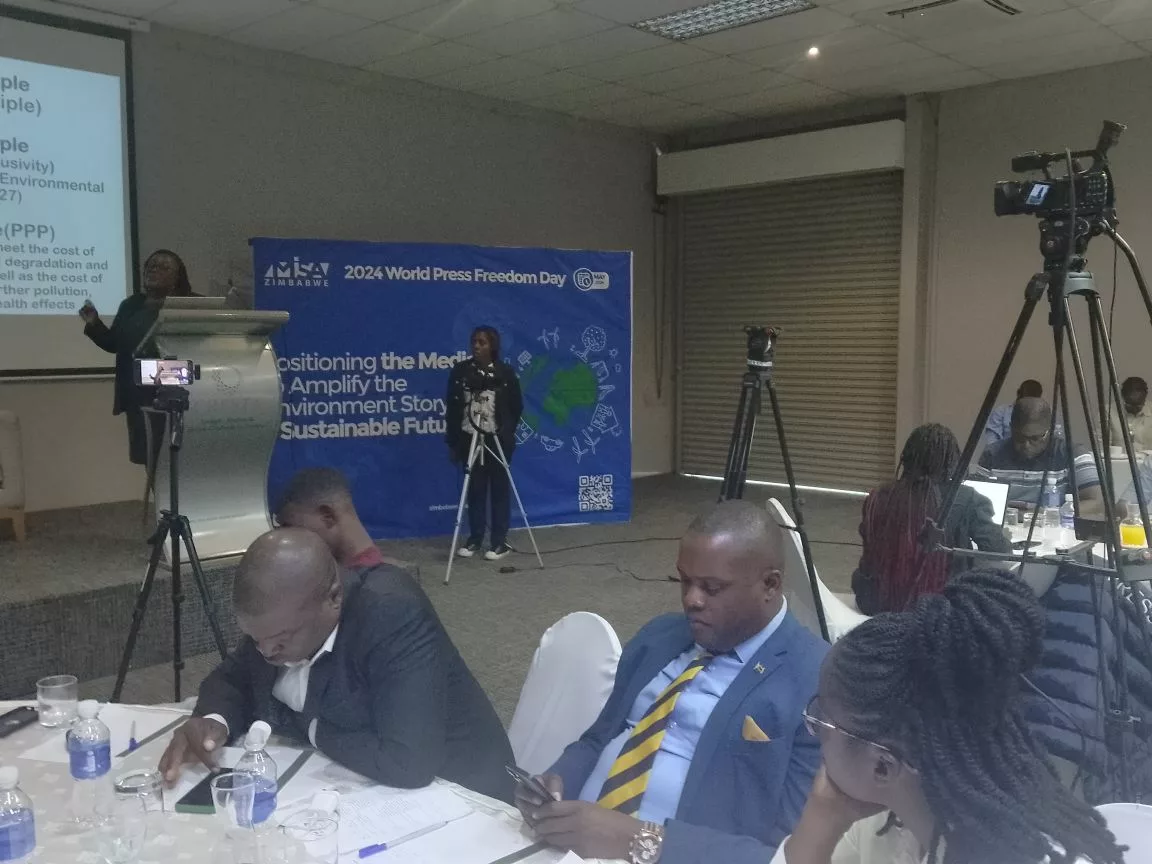|
Getting your Trinity Audio player ready...
|
The Media Institute of Southern Africa (MISA) Zimbabwe yesterday in Harare convened the World Press Freedom Day Commemoration – a day celebrated globally on 3 May, whereupon stakeholders reiterated the key role that the media plays in amplifying environmental stewardship.
The universal theme for this year is: “: A Press for the Planet: Journalism in the Face of the Environmental Crisis.”
Addressing participants, Kelvin Hamunyari Jakachira, a MISA Zimbabwe Trustee, alluded to UNESCO, which revealed that this year’s theme aims to highlight the significant role that the press, journalism, access, and dissemination of information play in ensuring and securing a sustainable future that respects the rights of individuals and their diversity of voices, as well as gender equality.
Speaking during the same occasion, Reuben Akili, a senior programme officer with the Combined Harare Residents Association (CHRA) said the theme is particularly relevant as Harare is currently facing a severe environmental crisis, including water pollution and the destruction of wetlands that have seriously impacted the quality and quantity of water in the capital.
On the other hand, he said the issue of waste management remains a big serious environmental issue with serious implications for the health of residents.
“We believe that the media plays a critical role in amplifying environmental injustices and promoting accountability and that journalists’ work is integral to environmental sustainability. Unfortunately, the continued shrinking of civic space undermines freedom of the press, which weakens environmental reporting and the mechanisms for ensuring accountability on environmental protection.
“The environment has been under threat from “big” corporations and powerful politicians hence the need for deliberate mechanisms to protect the media from reprisals from powerful people. We assert that environmental injustices happening in our communities must be reported without fear or favor. Journalists have a critical role in assisting communities tell their own stories on the current environmental crisis,” Akili said.
The failure to manage the environment and in particular non-collection of waste, unattended sewerage bursts, and erratic water supplies create room for waterborne disease outbreaks.
In this realm, Akili said journalists are strategically positioned to sustain the environmental agenda, in particular during this climate and environmental crisis impacting communities.
Mr Tawanda Collins Muzamwese, the Editor-in-Chief of the Green Business Gazette and Director of Toxiconsol Consultancy, said as the the world is currently faced with a plethora of environmental challenges, there is a need to communicate messages to key stakeholders.
“Media plays an important part in promoting environmental safety and health requirements. As such, the media should be kept up to date with environmental and climate change trends. It should be abreast with scientific discoveries. There is a need for the media to flag environmental case studies. In doing this, the media needs to highlight environmental success stories. The media needs intimate knowledge of emerging issues like climate finance, circular economy, and extended producer responsibility, bearing in mind the importance of fact-checking, collaboration with different stakeholders, and providing a variety of environmental stories instead of regurgitating articles on the same subject,” Muzamwese said.
Amkela Sidange, the Environmental Education and Publicity Manager of the Environmental Management Agency (EMA) said the basics of environmental management are premised on the Constitution of Zimbabwe as outlined in Section 73; policy pronouncements; national and international obligations; the Environmental Management Act(CAP 20:27); and a whole of Government Approach.
Sidange highlighted key characteristics of environmental information that the media must stick to.
“The information should be timeless, sustainable, or continuous. If environmental disasters like Cyclone Idai are to occur, the media should provide timely and prompt information by warning citizens to take appropriate measures like evacuation. The information should be accurate,
factual, objective, meaningful, and useful.
factual, objective, meaningful, and useful.
“It should be educative and must bring behaviour change in addition to being acceptable, applicable (from local to global, practical, inclusive, accessible, entertaining, and citizen-centric (nothing for us without us),” Sidanke added.
Brian Tomo, an officer with the Zimbabwe Media Commission (ZMC), outlined provisions for access to information by the media in promoting a clean environment. He encouraged media practitioners to utilise the Freedom of Information Act for a sustainable environment.
The meeting was attended by members of the media, community-based organisations (CBOs), and parliamentarians among others.






